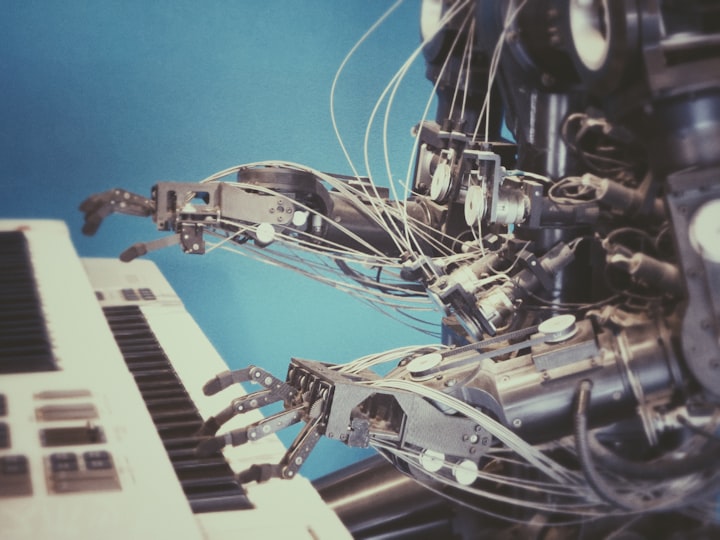The Future Of Artificial Intelligence
Unlocking the Potential of Technology

Artificial Intelligence (AI) has rapidly emerged as a transformative technology with the potential to revolutionize various aspects of our society, from healthcare and transportation to finance and entertainment. As we look to the future, the capabilities of AI are expected to continue advancing at an unprecedented pace, shaping the way we live, work, and interact. In this article, we will explore the potential future of AI, highlighting key areas where AI is expected to have a significant impact and discussing the opportunities and challenges that lie ahead.
1.Advancements in Machine Learning and Deep Learning
- Machine learning and deep learning are at the core of AI advancements. Machine learning algorithms enable computers to learn from data and make predictions or decisions, while deep learning algorithms, inspired by the human brain, enable computers to process complex data such as images, speech, and text. In the future, we can expect significant advancements in machine learning and deep learning techniques, leading to more accurate and sophisticated AI models.
- One key area of advancement is explainable AI, where AI models are designed to provide clear explanations for their decisions and predictions. This will enable users to better understand how AI arrives at its conclusions, increasing trust and transparency in AI systems. Additionally, AI models are expected to become more adaptable, able to learn and adapt in real-time to changing environments and data, making them more flexible and reliable in various applications.
2.AI in Healthcare
- AI has the potential to revolutionize healthcare, from disease diagnosis and treatment to personalized medicine and telemedicine. In the future, we can expect AI to play an even more significant role in healthcare, helping doctors and healthcare providers make more accurate and timely diagnoses, optimizing treatment plans, and improving patient outcomes.
- For example, AI-powered diagnostic tools can analyze medical images, such as X-rays and MRI scans, to detect early signs of diseases like cancer, enabling doctors to diagnose diseases at an earlier stage and provide more effective treatments. AI can also analyze vast amounts of patient data, such as electronic health records, to identify patterns and trends that can lead to better treatment plans and personalized medicine.
- Telemedicine, which has seen tremendous growth during the COVID-19 pandemic, is also expected to benefit from AI advancements in the future. AI-powered virtual assistants can assist in remote patient monitoring, provide medical advice, and help patients manage chronic conditions, improving access to healthcare services and reducing healthcare costs.
3.AI in Transportation and Autonomous Vehicles
- Autonomous vehicles, powered by AI, have the potential to revolutionize the way we travel and transport goods. In the future, we can expect to see significant advancements in AI for transportation, including self-driving cars, trucks, and drones.
- Autonomous vehicles can leverage AI to process data from various sensors, such as cameras, lidar, and radar, to make real-time decisions, navigate complex environments, and avoid accidents. They can also communicate with each other and with traffic infrastructure, optimizing traffic flow and reducing congestion on roads. With advancements in AI, autonomous vehicles are expected to become safer, more efficient, and more reliable, leading to increased adoption and potential benefits, such as reduced traffic accidents, improved transportation efficiency, and reduced fuel consumption.
4.AI in Finance
- AI is already being used in the finance industry for tasks such as fraud detection, risk assessment, and algorithmic trading. In the future, we can expect AI to continue transforming the finance industry, providing even more sophisticated and efficient solutions for complex financial tasks.
- Advancements in AI are expected to enable more accurate and timely financial predictions, helping investors make informed decisions and optimize their portfolios. AI-powered virtual financial advisors can provide personalized financial planning and investment advice, making financial services more accessible to a wider range of people.
- AI can also enhance fraud detection algorithms, identifying fraudulent activities in real-time and preventing financial losses.
5.AI in Education
- AI has the potential to transform the field of education, making learning more personalized, engaging, and accessible. In the future, we can expect to see AI playing a significant role in education, from personalized tutoring and adaptive learning platforms to automated grading and curriculum development.
- AI-powered tutoring systems can provide individualized instruction, adapting to the unique learning needs and preferences of each student. Adaptive learning platforms can analyze data on student performance and tailor learning experiences accordingly, optimizing learning outcomes. Automated grading using AI algorithms can provide efficient and objective assessments, reducing the burden on teachers and allowing for faster feedback to students.
- Moreover, AI can also help with curriculum development by analyzing vast amounts of data on learning outcomes, student engagement, and feedback to identify patterns and trends that can inform the design of more effective educational programs. AI can also facilitate access to education for underserved populations by providing language translation, accessibility features, and remote learning options.
6.Ethical Considerations and Social Impacts of AI
- As AI continues to advance, there are ethical considerations and social impacts that need to be addressed. One of the key challenges is bias in AI systems, as AI models are trained on large datasets that may contain biased information, leading to biased outcomes. It is crucial to ensure that AI systems are developed and deployed in an ethical manner, with fairness, transparency, and accountability as guiding principles.
- Another concern is the potential impact of AI on jobs and the workforce. While AI has the potential to automate repetitive tasks, it can also create new job opportunities and increase productivity in various industries. It is essential to proactively address the potential disruptions to the job market and ensure that workers are prepared for the changing landscape of work in the age of AI.
- Privacy and data security are also significant ethical considerations in the future of AI. As AI relies on vast amounts of data for training and decision-making, it is crucial to protect the privacy of individuals and ensure that data is used responsibly and securely. Regulations and policies around data collection, usage, and storage will play a crucial role in shaping the future of AI
In conclusion, the future of AI holds immense potential for transformative advancements across various domains, but it also presents ethical considerations, social impacts, and the need for human-AI collaboration. With careful planning, regulation, and education, AI can contribute to solving some of the world's most pressing challenges, from healthcare to transportation, finance to education, and beyond. The responsible and ethical development and deployment of AI will be key to harnessing its benefits and ensuring a better future for humanity.
Words: 1086





Comments
There are no comments for this story
Be the first to respond and start the conversation.